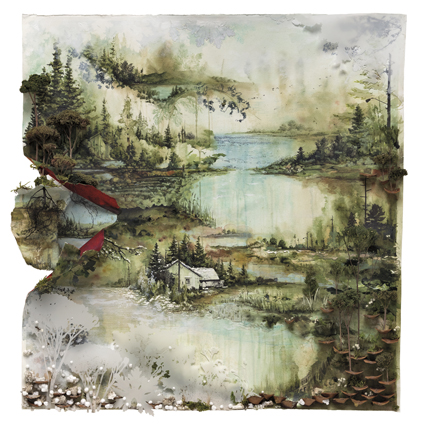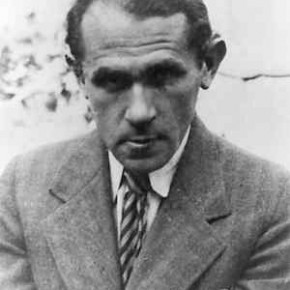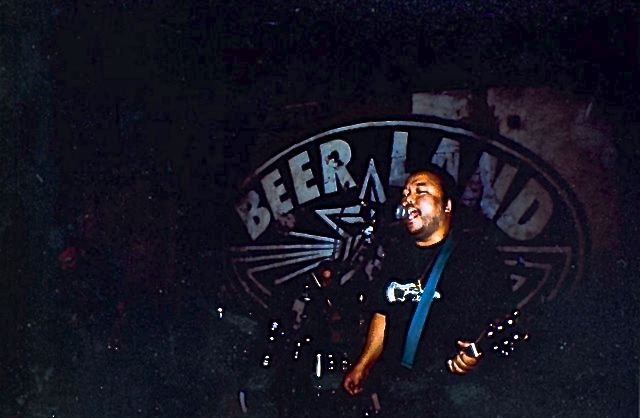The muse of that isolated winter is gone, replaced by a muse that’s on the run, loose in a wide world. Bon Iver, the band that had its phoenix-like beginning with the muted and hushed For Emma, Forever Ago, is now fully awakened. His recuperation complete, Justin Vernon is free to explore, reaching for a host of new sounds to adorn the band’s second record, Bon Iver.
For Emma arrived with a richer origin mythology than any other record in recent memory. The isolated cabin, the devastating losses of band and girl, the harsh Wisconsin winter, the obsessiveness and self-healing of the recording itself — it was all too compelling, all too perfectly matched to the music itself. Those fragile songs hung like paintings to be viewed in a still room, haunting in the impressions they left lingering. They were built of a self-reliance that was primal, instinctive.
Bon Iver can’t help but exist as a response to all that, a summation of the whirlwind travels and experiences that For Emma created for Vernon. The new record pulses with an exploratory urgency, its songs varied and complex, shifting moment to moment. It’s the sound of Vernon simultaneously collecting and making sense of a million new impressions of his post-Emma world. The songs are about places, about landscapes familiar and foreign, about moving and returning. They’re expansive, with depth, physicality and a clear sense of motion.
While Vernon is clearly at the helm, Bon Iver is an impressively collaborative effort. His touring bandmates Sean Carey, Mike Noyce and Matt McCaughan are behind the propulsive, dynamic rhythms that most distinguish the album from its predecessor. Pedal steel guitar from Greg Leisz, saxophone from Colin Stetson and strings from Rob Moose add unexpected dimensions that allow the album’s ever-present shape shifting.
I’ve seen Bon Iver twice live — first when For Emma was still gaining steam in August 2008, in San Francisco’s Golden Gate Park, and then the following September in Oakland’s Fox Theater — and observed how the quiet intensity of that debut record was already undergoing significant transformation in the hands of Vernon’s touring band. Live, the arrangements grew richer and the instrumentation stretched out. In retrospect, it’s easy to see how all those tours and shows after For Emma informed Vernon’s approach to this new record. There’s a depth and fluidity to the songs — to the arrangements, specifically — that place Bon Iver in a new territory all together.
The horns, strings and percussion that are applied throughout show both creativity and restraint on Vernon’s part. With more tools than ever available to him at his new April Base Studio (a mostly self-remodeled veterinary clinic near his Eau Claire, Wisconsin home), he could have run roughshod, painting his multicolor project into a dull brown corner. But what emerges instead is bright and provocative, with a clear sense of purpose.
The opening duo of “Perth” and “Minnesota, WI” blend seamlessly together, each turning from soft and meandering guitar expeditions into percussive anthems, injected with horns. At times spacey and futuristic, they surprisingly recall TV on the Radio.
With its bittersweet and tender finger-picked guitar, “Halocene” most resembles the style on For Emma, and is unsurprisingly the album’s most direct song. “Towers” begins with a chiming indie-rock electric guitar and then shifts with the arrival of Southwest horns, pedal steel and a shuffling country back-beat.
“Michicant” is tender, swaying, shoegazey. “Hinnom, TX” is disorienting and experimental, with Vernon leaning more on his deeper singing voice than his trademark falsetto. The subdued “Wash.” follows with bell-like piano and strings.
“Calgary,” the first single, is the propulsive highlight of Bon Iver. The album’s most dynamic song, it begins with slight and airy keyboard tones and Vernon’s high and spooky vocals, before building and building, via an insistent drum beat, into a track stuffed so full of sounds that you can’t catch them all at once.
As the buzzing, short instrumental “Lisbon, OH” yields to “Beth/Rest,” the album takes its biggest leap, oddly enough toward indulgent 1980s soft rock. It’s a strange move, one perhaps best understood as an exercise in context. With its piano, sax and high-production lead guitar, such a torch song would sound anachronistic as a single, but as the coda to a sonically expansive album, “Beth/Rest” seems to be in the right place.
The lyrics on Bon Iver seem secondary throughout; even as published, they often give little indication of specific meaning or intent. Some aren’t even words, while others read as a string of nonsense. Overall, the lyrics give the impression of existing as a verbal shorthand, as if Vernon felt For Emma gave away too much and decided to take the opposite approach this time around.
What sticks out are moments in which the words leap forward, matching the emotional pull of Vernon’s voice: “Never gonna break” on “Minnesota, WI,” “I was not magnificent” on “Halocene,” and, what stands apart as the closest thing to an overall thematic statement for the album, “I ain’t living in the dark no more,” from “Beth/Rest.”
Of course, the differences between Bon Iver’s first two records can’t be described straightforwardly in terms of dark vs. light. Nor does a winter vs. spring analogy quite fit. Though much of what Vernon does remains somewhat veiled, it’s clear that both records are intensely personal, vividly and evocatively documenting those periods in his life that were devoted to their creation. Indeed, he seems invested in forging a continuity of identity in the face of life’s massive, rushing changes. In that regard, For Emma was about a man turning himself inside out, while Bon Iver is about a new man returning to his old home.





